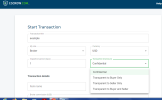- Impact
- 140
For example:
A broker comes to inquire about one of your domain names and closes the deal for $5,000 (and takes your 20% commission)
In reality, the buyer paid $10,000 for the domain
You end up netting $4,000 and the broker gets a $5,000 difference and a $1,000 commission.
Several friends around me have personally experienced this kind of thing. After the transaction was completed,
They found the contact information of the buyer, contacted the buyer and learned the amount the buyer finally paid for the domain name, and found that they were scammed by the broker.
This may be the rule of the game in the domain name industry.
May I ask if you have encountered or heard of similar things, welcome to discuss.
A broker comes to inquire about one of your domain names and closes the deal for $5,000 (and takes your 20% commission)
In reality, the buyer paid $10,000 for the domain
You end up netting $4,000 and the broker gets a $5,000 difference and a $1,000 commission.
Several friends around me have personally experienced this kind of thing. After the transaction was completed,
They found the contact information of the buyer, contacted the buyer and learned the amount the buyer finally paid for the domain name, and found that they were scammed by the broker.
This may be the rule of the game in the domain name industry.
May I ask if you have encountered or heard of similar things, welcome to discuss.







